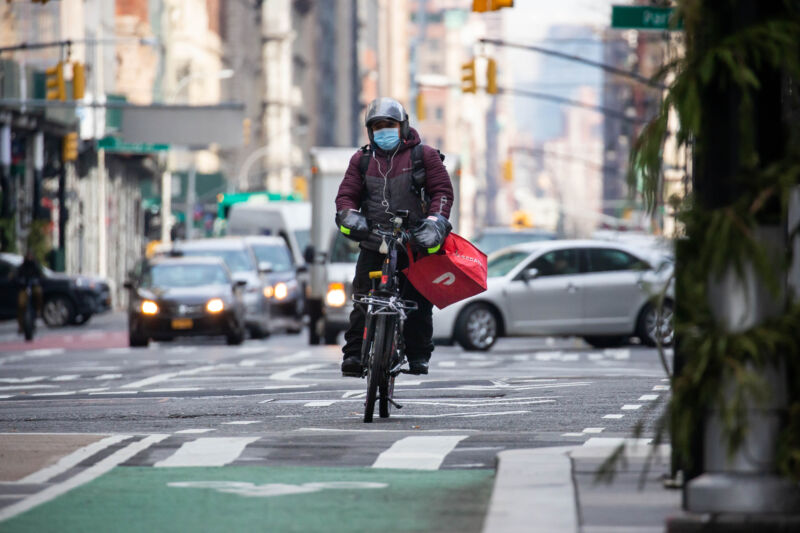
A class-action lawsuit claims that DoorDash uses hard-to-pin-down delivery fees to systematically charge the delivery service’s iPhone users more than others.
The lawsuit (PDF), filed May 5 in the District of Maryland, came in hot. Plaintiff Ross Hecox, in addition to his two children and a presumptive class of similarly situated customers, briefly defines DoorDash as an online marketplace with 32 million users and billions of dollars in annual revenue.
“Yet, DoorDash generates its revenues not only through heavy-handed tactics that take advantage of struggling merchants and a significant immigrant driver workforce, but also through deceptive, misleading, and fraudulent practices that illegally deprive consumers of millions, if not billions, of dollars annually,” the suit adds. “This lawsuit details DoorDash’s illegal pricing scheme and seeks to hold DoorDash accountable for its massive fraud on consumers, including one of the most vulnerable segments of society, minor children.”
Specifically, the suit claims that DoorDash misleads and defrauds customers by
- Making its “Delivery Fee” seem related to distance or demand, even though none of it goes to the delivery person.
- Offering an “Express” option that implies faster delivery, but then changing the wording to “Priority” in billing so it is not held to delivery times.
- Charging an “Expanded Range Delivery” fee that seems based on distance but is really based on a restaurant’s subscription level and demand.
- Adding an undisclosed 99 cent “marketing fee,” paid by the customer rather than the restaurant, to promote menu items that customers add to their carts.
- Obscuring minimum order amounts attached to its “zero-fee” DashPass memberships and coupon offers.
- Generally manipulating DashPass subscriptions to appear like substantial savings, when the company is “engineering” fees to seem reduced.
One of the more interesting and provocative claims is that DoorDash’s fees, based in part on “other factors,” continually charge iPhone users of its app more than Android users placing the same orders. The plaintiffs and their law firm conducted a few tests of DoorDash’s system, using different accounts to order the same food, from the same restaurant, at almost the same exact time, delivered to the same address, with the same account type, delivery speed, and tip.
Panera, Chipotle, and Chick-fil-A research
In one test, an iPhone user placing a Panera order was charged an Expanded Range Fee of 99 cents, while an Android user—who was, though it technically shouldn’t matter, 15 miles away from the delivery address—was not. On another test, identical Chick-Fil-A orders to an address resulted in the iPhone user—this time, the one 15 miles away—paying $1 more in Delivery Fee. A third test on a Chipotle order, this time with both users in the same place, saw the iPhone user charged both more for a Delivery Fee and an Expanded Range Fee, an 8 percent increase over Android.
The plaintiffs did four more tests, in which the iPhone user was:
- Charged $5 more despite being closer to a different Panera than the Android user
- Shown a “discounted” Delivery Fee despite paying $2 more than Android
- Charged more than they were for the same order than while logged in to the Android device
- Received less of a discount with their DashPass account than another Android user with DashPass
“As the above tests demonstrate… DoorDash routinely charges iPhone users more than Android users for reasons wholly unrelated to delivery and service costs,” the complaint claims. “DoorDash likely charges iPhone users more because studies suggest that iPhone users make more money than Android users,” it concludes, citing a blog post that rounds up a number of broad surveys and statistics about iPhone versus Android users.
The various surveys suggest that iPhones tend to attract higher-income buyers (SlickDeals, 2018), have a higher usage share among 18-34-year-olds (Mercator Advisory Group, 2019), and spend twice as much in apps than Android users (Statista, 2022).
The plaintiffs are asking for $1 billion in damages for those who “fell prey to DoorDash’s illegal pricing” over the past four years. The suit also includes allegations that DoorDash improperly allows children to enter into contract with the company without proper vetting.
DoorDash, which raised $3.2 billion during its 2020 initial public offering, provided a statement to numerous media outlets in response to the suit.
“The claims put forward in the amended complaint are baseless and simply without merit,” a DoorDash spokesperson states. “We ensure fees are disclosed throughout the customer experience, including on each restaurant storepage and before checkout. Building this trust is essential, and it’s why the majority of delivery orders on our platform are placed by return customers. We will continue to strive to make our platform work even better for customers, and will vigorously fight these allegations.”
https://arstechnica.com/?p=1940882

